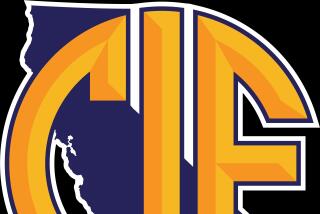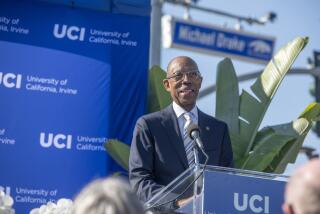University of Miami President Calls a Meeting to Reform NCAA
- Share via
PHOENIX — Citing the need for reform of the National Collegiate Athletic Assn., the president of the University of Miami has called a March meeting of presidents of Division I schools.
Edward T. Foote II, president of the defending national football champion University of Miami, will be the host for a March 1-2 meeting at Coral Gables, Fla., to discuss the problems of the NCAA and what Foote calls the huge organization’s lack of responsiveness to current athletic and academic concerns.
“I don’t think the present system of governing works very well,” said Foote, who is here for the Fiesta Bowl, in which the University of Miami plays UCLA today.
“The NCAA is ill-equipped to deal with problems that now confront major college athletics. The organization is too big, with too many interests groups to accommodate many larger institutions. Additionally, it acts too slowly to deal with the real and significant problems of athletics.”
In a letter distributed to other university presidents in September, Foote had suggested the creation of an organization to govern intercollegiate athletics. The organization could be under the NCAA umbrella and should address the needs of the nation’s larger universities, the letter said.
“Our No. 1 concern, and that of the NCAA, is academic enrichment,” Foote said. “Our concern is the promotion and continuance of collegiate athletics and academics, but that has been lost in the shuffle of big money in the NCAA.”
The March meeting will likely bring together some of the 35 university presidents who in 1983 called for the shifting of authority for collegiate sports from athletic directors and others to the presidents. “We are the only group where athletic and academic interests converge,” Foote said.
Foote said the proposal will be discussed at the 1985 NCAA convention.
Foote believes the 1,000-member NCAA is fractionalized and, by its sheer bulk, unable to move quickly on pressing issues. His proposal, in general, calls for the establishment of an organization that would govern 100 to 150 larger universities. The group could operate from within the NCAA, or it could, as the College Football Assn. has done, splinter off.
“I have talked extensively to presidents of many universities,” Foote said. “The ones from the smaller schools simply don’t have the same problems we have.
People with differing views tend to be cast as antagonistic. We are not. I find a lot of well-intentioned, good people in athletics. I’m not talking about ousting this or that person. I am talking about fundamental reform.”
NCAA Executive Director Walter Byers has this year publicly criticized the NCAA, calling some aspects of the organization “ethically bankrupt.” Byers was reacting to a recent Supreme Court decision that the NCAA violated antitrust laws in negotiating television rights for universities.
Other pressing problems facing the NCAA are a new drug-enforcement program, athletes failing to complete their education, and the rise in rules violations by colleges.
“The problem with enforcement is that no one person can be held accountable,” Foote said. “We need academic reform. We have a good standing rule (that requires all student-athletes to be enrolled in a program leading to a degree). It took years to get that rule clarified. It was vague. It seems the general reaction is that it is still unenforced because the process takes too long.”
The University of Miami was on NCAA probation for football recruiting violations committed between 1976 and 1980.
Foote is a member of a 26-member board that has studied abuses in intercollegiate athletics. He has spoken out against freshman eligibility and has called for more stringent academic standards for athletes.
Foote is also a member of the American Council on Education’s committee on Division I athletics. It was the ACE’s floor fight at the 1983 NCAA convention that led to the adoption of Proposition 48, which requires incoming freshmen to have a 2.0 (out of 4.0) grade-point average in a core curriculum of 11 academic subjects. It also requires a minimum score of 700 (out of 1,600) on the Scholastic Aptitude Test, or 15 (out of 36) on the American College Test, starting in 1986.
More to Read
Go beyond the scoreboard
Get the latest on L.A.'s teams in the daily Sports Report newsletter.
You may occasionally receive promotional content from the Los Angeles Times.







